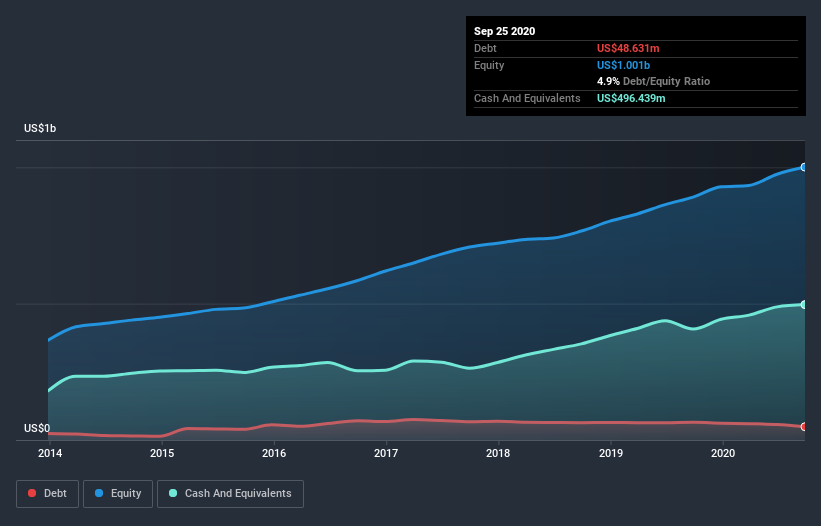These 4 Measures Indicate That Fabrinet (NYSE:FN) Is Using Debt Safely
Legendary fund manager Li Lu (who Charlie Munger backed) once said, 'The biggest investment risk is not the volatility of prices, but whether you will suffer a permanent loss of capital.' So it might be obvious that you need to consider debt, when you think about how risky any given stock is, because too much debt can sink a company. As with many other companies Fabrinet (NYSE:FN) makes use of debt. But the more important question is: how much risk is that debt creating?
When Is Debt Dangerous?
Debt and other liabilities become risky for a business when it cannot easily fulfill those obligations, either with free cash flow or by raising capital at an attractive price. In the worst case scenario, a company can go bankrupt if it cannot pay its creditors. However, a more common (but still painful) scenario is that it has to raise new equity capital at a low price, thus permanently diluting shareholders. Of course, debt can be an important tool in businesses, particularly capital heavy businesses. The first thing to do when considering how much debt a business uses is to look at its cash and debt together.
Check out our latest analysis for Fabrinet
How Much Debt Does Fabrinet Carry?
You can click the graphic below for the historical numbers, but it shows that Fabrinet had US$48.6m of debt in September 2020, down from US$65.0m, one year before. But on the other hand it also has US$496.4m in cash, leading to a US$447.8m net cash position.
A Look At Fabrinet's Liabilities
According to the last reported balance sheet, Fabrinet had liabilities of US$355.4m due within 12 months, and liabilities of US$69.3m due beyond 12 months. Offsetting this, it had US$496.4m in cash and US$325.2m in receivables that were due within 12 months. So it actually has US$397.0m more liquid assets than total liabilities.
This surplus suggests that Fabrinet has a conservative balance sheet, and could probably eliminate its debt without much difficulty. Succinctly put, Fabrinet boasts net cash, so it's fair to say it does not have a heavy debt load!
But the other side of the story is that Fabrinet saw its EBIT decline by 2.6% over the last year. If earnings continue to decline at that rate the company may have increasing difficulty managing its debt load. When analysing debt levels, the balance sheet is the obvious place to start. But it is future earnings, more than anything, that will determine Fabrinet's ability to maintain a healthy balance sheet going forward. So if you're focused on the future you can check out this free report showing analyst profit forecasts.
Finally, a company can only pay off debt with cold hard cash, not accounting profits. Fabrinet may have net cash on the balance sheet, but it is still interesting to look at how well the business converts its earnings before interest and tax (EBIT) to free cash flow, because that will influence both its need for, and its capacity to manage debt. Over the last three years, Fabrinet actually produced more free cash flow than EBIT. That sort of strong cash conversion gets us as excited as the crowd when the beat drops at a Daft Punk concert.
Summing up
While it is always sensible to investigate a company's debt, in this case Fabrinet has US$447.8m in net cash and a decent-looking balance sheet. And it impressed us with free cash flow of US$132m, being 107% of its EBIT. So is Fabrinet's debt a risk? It doesn't seem so to us. The balance sheet is clearly the area to focus on when you are analysing debt. However, not all investment risk resides within the balance sheet - far from it. To that end, you should be aware of the 1 warning sign we've spotted with Fabrinet .
At the end of the day, it's often better to focus on companies that are free from net debt. You can access our special list of such companies (all with a track record of profit growth). It's free.
This article by Simply Wall St is general in nature. It does not constitute a recommendation to buy or sell any stock, and does not take account of your objectives, or your financial situation. We aim to bring you long-term focused analysis driven by fundamental data. Note that our analysis may not factor in the latest price-sensitive company announcements or qualitative material. Simply Wall St has no position in any stocks mentioned.
Have feedback on this article? Concerned about the content? Get in touch with us directly. Alternatively, email editorial-team@simplywallst.com.

